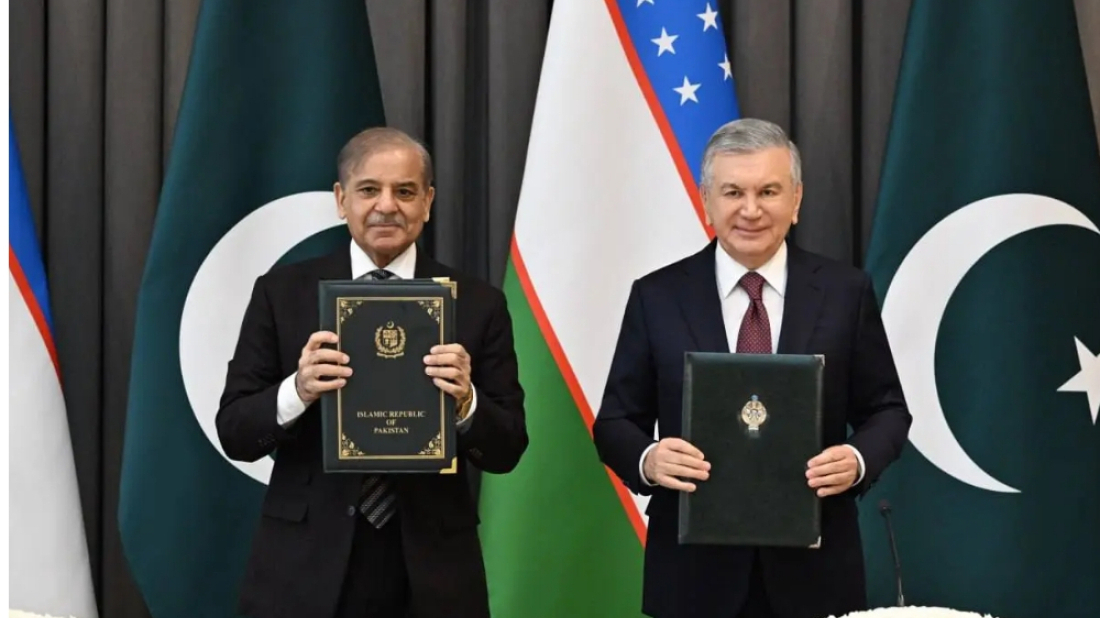Iran stores highly enriched uranium underground, IAEA says
Some of Iran's most highly enriched uranium, close to weapons grade, was stored in an underground area of its nuclear site in Isfahan, the UN nuclear ...

Leaders of Uzbekistan and Pakistan has agreed to establish a Supreme Council of Strategic Partnership and hold its first meeting next year. Pakistan's Prime Minister Muhammad Shehbaz Sharif paid an official visit to Uzbekistan after his two-day talks in Azerbaijan.
On 26th February, President of Uzbekistan Shavkat Mirziyoyev and Prime Minister of the Islamic Republic of Pakistan Shehbaz Sharif held negotiations in Tashkent.
The parties signed a joint declaration and a protocol on the establishment of a Bilateral Strategic Partnership Council at the highest level, aimed at "further developing and strengthening Uzbek-Pakistani relations through multifaceted cooperation," according to the statement.
"The visit underscored the deep-rooted, historic, and fraternal ties between Pakistan and Uzbekistan and reaffirmed the commitment of the leadership of both countries to further strengthen bilateral cooperation," - said today's statement of Prime Minister's Office.
Both parties shared their perspectives on improving collaboration across various sectors, such as trade, connectivity, culture, and exchanges between people. The discussions emphasized the advancement of regional connectivity via the trans-Afghan railway and trade corridors.
Mirziyoyev and Sharif also participated in the Uzbek-Pakistani business-forum.
In his speech, Mirziyoyev emphasized that Uzbekistan has become Pakistan’s largest trade partner in Central Asia.
Trade turnover between Uzbekistan and Pakistan grew from $122 million in 2019 to $387 million in 2023. In 2024, the trade turnover exceeded $400 million and the number of joint enterprises reached 130.
Over the past few years the volume of cargo transportation through the multimodal corridor “Uzbekistan-Afghanistan-Pakistan” has increased fivefold.
“Having huge potential, our economies can effectively complement each other,” said the Uzbek president.
He mentioned the beginning of construction of a railway connecting China with Kyrgyzstan and Uzbekistan, adding that in the future, this strategic railway may have a link to the ports of Pakistan, which will significantly increase mutual trade and investment.
Uzbek and Pakistani companies consider cooperation in pharmaceuticals, electrical engineering, agrarian sector, agricultural machinery, geology and mineral resources, textile, leather and other industries.
The parties agreed to increase trade turnover between Uzbekistan and Pakistan to $2 billion and to establish a joint transport and logistics company.
Uzbekistan's government portal reported that following documents were signed during the visit in the presence of the two leaders:
- Agreement on cooperation in the field of science, technology and innovations;
- Agreement on visa-free travels of holders of diplomatic passports;
- Agreement on cooperation between the Ministries of Interior;
- Agreement on cooperation in the field of vocational education;
- Agreement on cooperation in the field of youth policy;
- Agreement on cooperation between national information agencies;
- cooperation agreements and arrangements between diplomatic academies, the cities of Tashkent and Lahore.
The death toll from heavy rains and flooding in Brazil’s Minas Gerais state has risen to 46, authorities said, with 21 people still reported missing. The storms triggered landslides and widespread flooding, displacing thousands across Juiz de Fora and Uba.
The situation in Cuba was heating up and called for restraint following a deadly incident involving a Florida-registered speedboat off the coast of the Caribbean island, the Kremlin said on Thursday (26 February).
Syria’s economy is showing clear signs of recovery, with economic activity accelerating in recent months, the International Monetary Fund (IMF) said on Wednesday.
The United States has deployed the aircraft carrier USS Gerald R. Ford near Israel as part of a growing military build-up amid tensions with Iran, while governments around the world urge their citizens to leave parts of the region.
Pakistani air strikes hit a weapons depot on the western outskirts of Kabul overnight, triggering hours of secondary explosions that rattled homes across the Afghan capital and left residents fearing further violence.
Pakistani air strikes hit a weapons depot on the western outskirts of Kabul overnight, triggering hours of secondary explosions that rattled homes across the Afghan capital and left residents fearing further violence.
Israeli strikes killed five people in Gaza on Thursday (26 February), according to health officials in the territory. The Israeli military said separately that it had killed a militant who posed an imminent threat to its forces in southern Gaza.
Iran’s Foreign Minister Abbas Araghchi on Friday urged Afghanistan and Pakistan to resolve their differences through dialogue, offering Tehran’s assistance to facilitate understanding between its eastern neighbours.
Ankara has rejected media reports claiming it plans to deploy military forces into Iranian territory in the event of a U.S. attack on the Islamic republic.
Georgia’s path towards European Union membership is facing its most serious crisis to date, with senior European lawmakers warning that the country is now a “candidate in name only” and accusing the ruling government of reversing democratic progress and drifting away from Europe.
You can download the AnewZ application from Play Store and the App Store.

What is your opinion on this topic?
Leave the first comment